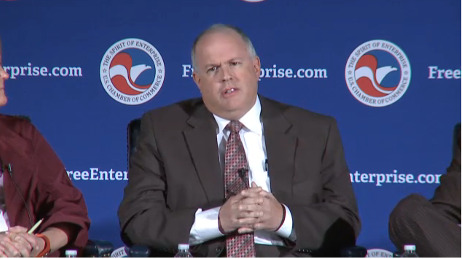The Dodd-Frank Act provided the foundation for more regulation of auto financing by federal regulators. Now a state-level agency is leveraging Dodd-Frank to seek orders against a New York-based subprime lender.
Benjamin Lawsky, who is New York’s Superintendent of Financial Services, obtained a temporary restraining order in federal court this week against Condor Capital Corp., a subprime auto lender headquartered on Long Island, and its owner, Stephen Baron.
Lawsky explained a DFS investigation uncovered that allegedly Condor has engaged in a longstanding scheme to steal millions of dollars from its customers — among other unfair, abusive, and deceptive practices.
As part of its ongoing legal proceeding, DFS is seeking restitution for Condor consumers, disgorgement of profits, the appointment of a receiver to wind down Condor’s operations, and other remedies.
Lawsky indicated the proceeding against Condor is the first legal action initiated by a state regulator under section 1042 of the federal Dodd-Frank Wall Street Reform and Consumer Protection Act. Lawsky noted that provision empowers state regulators to bring civil actions in federal court for violations of Dodd-Frank’s consumer protection requirements, and obtain restitution for abused customers and other remedies provided for under that law.
“When companies abuse New York consumers, we will use any tool at our disposal to get restitution and help make things right,” Lawsky said. “As alleged, the defendants bilked millions of dollars from vulnerable borrowers who could least afford it. We are taking swift action today to stop them from abusing any more consumers and help obtain relief for those who were victimized.”
Condor is a finance company that acquires and services loans to customers in New York and more than two dozen other states, including:
—Alabama
—California
—Colorado
—Connecticut
—Florida
—Georgia
—Iowa
—Illinois
—Indiana
—Kansas
—Kentucky
—Maine
—Maryland
—Michigan
—Minnesota
—Missouri
—Mississippi
—North Carolina
—Nebraska
—New Jersey
—Ohio
—Oklahoma
—Oregon
—Pennsylvania
—Tennessee
—Texas
—Virginia
—Washington
—West Virginia
According to its website, Condor was founded in 1994 by a management team with more than 50 years of auto financing experience.
“Our commitment is to provide the best customer care to consumers and the thousands of dealers we service. Our goal is to train and equip our staff with state of the art technology to serve our customers in the most courteous and professional manner possible,” company officials said.
The company located in Hauppauge, N.Y., also mentioned the suit on its website.
“Pursuant to a court order, Condor Capital Corp. is not currently accepting new loans or applications for new loans,” officials said. “Existing and former customers of Condor Capital Corp. continue to have access to their accounts through this website.
“If you are a current or former customer of Condor Capital Corp. and you believe that you may have a positive credit balance owed to you, you may file a complaint with the New York State Department Of Financial Services,” the company goes on to say.
According to Condor’s most recent annual report filed with DFS, at the end of 2013, Condor held more than 7,000 loans to New York customers with total outstanding balances of more than $97 million. That reported showed Condor’s 2013 loan portfolio contained aggregate outstanding loans of more than $300 million nationwide.
For the year, Condor reported net after-tax income of approximately $7 million on operating income of approximately $68.7 million, DFS said.
According to the complaint brought by DFS, Condor is alleged to have systematically hid from its customers the fact that they have refundable positive credit balances.
“A positive credit balance is money owed by Condor to a customer as a result of an overpayment of the customer’s account that can come about in several different ways,” DFS officials said. “For example, a customer might pay more than the outstanding loan balance, a car may be destroyed (or totaled), and the insurance proceeds might exceed the outstanding loan balance, or a customer might trade in the car that is the subject of the loan and receive a credit greater than the outstanding balance.
As alleged, rather than notifying customers of positive credit balances and promptly paying them refunds, agency officials said Condor has “for years knowingly and systematically hidden the existence of the positive credit balances and retained them for itself, and has maintained a policy of refusing to refund them except when expressly requested by a customer.
“Condor has ensured that such requests will occur rarely, if ever, by actively concealing the existence of positive credit balances to prevent customers from detecting them and requesting refunds,” they continued.
For example, DFS alleged that Condor has deceptively programmed its customer-facing Web portal to shut down a customer’s access to his or her loan account once the loan has been paid off, even if there is a positive credit balance due to the customer.
Condor is also alleged to have endangered the security of its customers’ personally identifiable information, placing them at serious risk of identity theft.
Among other information-security lapses, the DFS examiners found stacks of hundreds of hard-copy customer loan files lying around the common areas of Condor’s offices.
State officials noted that Condor also has failed “despite repeated directives from DFS” to adopt basic policies, procedures and controls to ensure that its information technology systems and the customer data they contain are secure.
DFS said it reviewed and analyzed numerous complaints about Condor.
“Multiple customers have alleged that Condor has harassed and threatened customers and friends and relatives of customers, including for accounts that are current,” officials said. “Other customers have alleged that Condor has reported inaccurate information to credit agencies, imposed fees or late charges where none are appropriate, or has failed to properly apply payments to loan balances.
Still other complainants — including complainants that are not Condor customers — have alleged that Condor has made unauthorized charges to their credit cards or unauthorized debits from their bank accounts,” DFS went on to say.
The allegations in DFS’s complaint remain subject to proof at trial. The court has scheduled a hearing on DFS’s request for a preliminary injunction for Tuesday at 10 a.m.
To view the entire complaint, click here.
EFG Companies highlighted that it recently became one of the first F&I product providers to have its entire field services team certified by Association of Finance and Insurance Professionals (AFIP).
By certifying its entire team at once, EFG explained that it’s now possible for its client base to receive the immediate benefits of the company’s certification, whether through mentoring the dealer’s staff through AFIP certification, one-on-one coaching or completing dealer compliance audits.
Founded in 1989, AFIP is the nonprofit, non-aligned sanctioning body for in-store sales and financial services personnel and select lender and aftermarket vendor personnel in the United States. AFIP certification curriculum focuses solely on the federal and state laws that govern in-dealership financial services.
EFG Companies president and chief executive officer John Pappanastos emphasized the retail automotive industry has always been one of the most highly regulated. With the recent increase in regulation oversight, Pappanastos insisted non-compliance can create massive financial exposure for dealers, lenders, agents and vendors.
“Our clients look to us to ensure that their teams have appropriate processes and controls in place to navigate more than a dozen federal laws and find their way through the many state and local laws that impact their operations,” Pappanastos said.
“With that in mind, we took the initiative to get our entire field services team certified by the only regulatory compliance program that requires proctored exams under controlled testing conditions. Achieving AFIP certification across the entire team demonstrates our commitment to our clients,” he went on to say.
With its field team 100 percent AFIP certified, EFG’s client representatives, trainers and recruiters can more effectively train, audit and support their clients, who will continue to see compliance with state and federal regulatory requirements as a critical priority in their business moving forward.
“AFIP’s primary objective is to protect dealers by ensuring that in-dealership F&I practitioners and sales executives are fully aware of the applicable state and federal regulations — and take responsibility for their actions,” AFIP executive director, David Robertson. “Regulatory knowledge, coupled with personal accountability, keeps thousands of dealers out of harm’s way.”
One of the things I love about being a dealer is that no two days are ever the same. Maintaining and growing a business requires constant vigilance and engagement with manufacturers, employees, vendors, and so many others.
In the middle of my daily schedule, I find that keeping tabs on events in Washington can easily fall to the bottom of my to-do list. Thankfully, AIADA hosts its annual Summit in Washington, D.C., each spring.
For years, I’ve made a point of attending the two-day event because it provides a rare opportunity in my busy schedule to focus my energy exclusively on the legislation and policy that is impacting my business in real and tangible ways.
Washington’s intrusion into our businesses is more prominent than ever, and I believe we’ve all felt its weight in one way or another. Especially in recent years, legislation, regulations, and rhetoric have combined to create an atmosphere inside the beltway that is unfriendly to those like us who are fighting to make our communities a better place and to live and work.
I’m the first to admit that it can be overwhelming—especially when we all have so much else on our plates and Washington seems intent on stalling and avoiding solutions. But, I’ve never known dealers to run away from a challenge and disengage.
I firmly believe we must do anything and everything we can to have a say in Washington’s big decisions that impact us, our dealerships, and our employees in real and tangible ways. That starts with understanding the issues at stake and understanding how we should communicate our concerns to our leaders. For seasoned dealers and those who are just getting started in the business, AIADA’s Summit is a great place to start.
This year’s summit will take place May 7 and 8 at the Hyatt Regency Washington Capitol Hill. Speakers will include former vice presidential candidate and Wisconsin Rep. Paul Ryan, who will brief dealers on the issues that continue to grip Washington, D.C.
We’ll also be joined by Cook Political Report editor Charlie Cook, former White House budget director Jim Nussle, and best-selling author and viral ideas expert Jonah Berger. We’ll also host the always-popular automaker panel discussion, which will include executives from Volkswagen and Honda. Finally, dealers will have the opportunity to visit their lawmakers on Capitol Hill.
I look forward to seeing many of you join me on Capitol Hill. It starts with us to protect the future of our dealerships.
Larry Kull is the 2014 chairman of the American International Automobile Dealers Association.
A lawsuit filed by New York’s attorney general resulted in a shutdown of an independent dealer because a law enforcement investigation found the store misled customers and failed to pay off liens on used vehicles.
Attorney General Eric Schneiderman said earlier this week that Frontier Autohaus located in Rochester, N.Y., accepted trade-ins that still had remaining loan balances and failed to pay off these balances before reselling the vehicle to unwitting consumers. As a result, Schneiderman said previous owners remained on the hook for their original loan, and new owners were unable to register their vehicles.
Schneiderman filed a lawsuit that resulted in the Monroe County Supreme Court ordering the dealership permanently closed, mandating the sale of its assets, and prohibiting its owner, Shawn Minnehan, from ever again operating a dealership in the state of New York.
The dealership and its owner are also required to pay $289,000 in restitution to 46 consumers, and $50,000 in fines and other costs to New York State.
Schneiderman’s office also partnered with several financial institutions to help ensure the return of vehicles to consumers who were defrauded, the forgiveness of loans for consumers who were misled and the payment to victims of proceeds from a Department of Motor Vehicles insurance bond.
“A car is one of the biggest purchases many New Yorkers will make, and consumers should have confidence that they will not be misled by unscrupulous businesses that fail to uphold their legal obligations,” Schneiderman said. “My office will aggressively pursue those who flout the law and abuse consumers in the marketplace.”
An investigation by the attorney general’s office found that Frontier Autohaus did not have clear titles to many of the vehicles it sold, and, in some cases, no title at all.
Law enforcement discovered consumers who took out loans to buy vehicles from Frontier Autohaus discovered weeks later that the units had liens against them because Frontier Autohaus had failed to pay off loan balances and titles were not transferred to consumers. As a result, consumers were at risk of having their vehicles repossessed by lenders who held liens that Frontier had failed to pay off.
Without the titles, consumers were unable to register their vehicles and could have had their licenses suspended if they continued to drive them. These consumers were stuck making payments on the new loan while unable to legally operate the vehicles.
Additionally, Schneiderman said many consumers traded in vehicles when they purchased their vehicles, but Frontier Autohaus did not pay off these trade-ins before reselling. As a result, lenders continued to pursue loan payments from consumers for vehicles they no longer possessed.
According to the attorney general’s investigation, Frontier Autohaus also promised to handle the title and registration transfer for consumers for a fee, typically $150, and issued temporary registration stickers that permitted consumers to drive their newly purchased vehicles for 45 days.
Schneiderman also mentioned that Frontier often failed to submit registration and title materials to the DMV for consumers who paid Frontier to handle this service. These consumers were forced to go to the DMV and pay a second time to register their vehicles.
“In addition to unscrupulous sales and titling practices, Frontier charged customers for warranties to cover the used vehicle they purchased, but the company pocketed the money instead of purchasing coverage from the companies responsible for administering warranty coverage,” Schneiderman said. “When consumers attempted to use the warranty coverage, they found that none existed.”
The Consumer Financial Protection Bureau said in its annual report that consumer complaint volume increased 80 percent in 2013, but vehicle loan issues still constitute only a small amount of the overall total.
The CFPB indicated this week that overall complaint volume nearly doubled from 91,000 complaints received in 2012 to 163,700 complaints received in 2013. However, only about 3,500 complaints from last year’s total were associated with either a vehicle loan or lease.
From July 21, 2011 through June 30 of last year, the CFPB received approximately 176,700 consumer complaints, but during that stretch vehicle contracts comprised only a small amount of that total figure — about 2,700 complaints.
The bureau carved out percentages of complaint categories that comprised vehicle contract issues in 2013. That breakdown went as follows:
—44 percent: Managing the loan or lease (billing, late fees, damage or loss, insurance GAP, credit, etc.), credit reporting, privacy.
—23 percent: Taking out the loan or lease or account terms and changes (changes after closing, rates, fees, etc.), required add-on products, trade-in payoff, fraud.
—22 percent: Problems when consumers are unable to pay (debt collection, repossession, deficiency, bankruptcy, default).
—11 percent: Shopping for a loan or lease (Sales tactics or pressure, credit denial, confusing advertising or marketing).
To date, including this year, the CFPB said it has received more than 310,000 complaints overall. According to the latest report, the top three complaints in 2013 by consumers were:
—Mortgages: The No. 1 most-complained about consumer product was mortgages, accounting for 37 percent of overall complaints. For these approximately 60,000 complaints, consumers were most concerned with problems when they were unable to pay, such as issues relating to loan modifications, collections, or foreclosures.
—Debt collection: Debt collection was the second most complained about category, accounting for 19 percent of overall complaints even though the bureau did not begin accepting debt collection complaints until July of last year. For the approximately 31,000 debt collection complaints, consumers were most concerned with collectors attempting to collect debt not owed, communication tactics by the collectors, and collectors taking or threatening illegal action.
—Credit reporting: The No. 3 most complained about category was credit reporting, accounting for about 15 percent of overall complaints. For the approximately 24,000 complaints about credit reporting, nearly three out of four consumers were concerned with incorrect information on their credit report.
The bureau explained that it expects companies to respond to complaints within 15 days and to describe the steps they have taken or plan to take.
CFPB director Richard Cordray went on to mention that the agency expects companies to close all but the most complicated complaints within 60 days.
Cordray noted companies have responded to more than 93 percent of the complaints sent to them for response, and consumers have disputed only 21 percent of those company responses.
“Consumer complaints have become central to the work of this agency,” Cordray said. “They enable us to listen to, and amplify, the concerns of any American who wants to be heard.
“They are also our compass. They make a difference by informing our work and helping us identify and prioritize problems for potential action,” he went on to say.
Compliance obligation management software provider Compli is hosting a free webinar to help companies navigate workplace challenges coming this year.
The session titled, “Positioning Your Business for the 2014 Workplace,” is set to include Jean Roque, president and owner of Trupp HR. Roque plans to discuss what firms will need to know to protect the business from compliance and risk oversights while positioning the company to attract and retain top talent.
Other parts of the webinar agenda include:
• Learn about trending talent management and HR strategies
• Discover outlooks and influencers impacting compensation strategies
• Identify trends and requirements affecting workforce obligations such as benefit design and administration
• Gain awareness of recent changes in the compliance and regulatory environment and learn how your business can easily implement solutions
“With change on the horizon for workplaces in 2014, bringing together complex business obligations and initiatives that span your various departments, including compliance, human resources, operations and IT, can be a challenging task,” Compli officials said.
“Add to that additional business factors to consider such as the economic outlook, regulatory environment, political agendas, health care policies and workforce demographics, and you have a complex stew on your hands,” they continued. “How will all of these changes impact your company values and business decisions? Are you positioned to successfully navigate these changes?”
The webinar will begin at 2 p.m. ET on April 2. To complete the registration, click here.
Andy Koblenz, executive vice president and general counsel for the National Automobile Dealers Association, heard leaders from the Consumer Financial Protection Bureau speak last week and again left with questions about how the new regulatory agency intends to oversee vehicle financing.
Koblenz indicated during a panel session of an event hosted by the U.S. Chamber of Commerce that two points struck him during earlier remarks from CFPB deputy director Steve Antonakes.
“He talked about their commitment to providing clear rules of the road. And yet when you look at the indirect auto lending area, every indirect auto lender that I’ve spoken to when I asked them if they understand what the methodology that the CFPB is using for their disparate impact analysis, whether it’s the proxy methodology of the statistical controls methodology, they all say no and they’re still guessing at it,” Koblenz told attendees at the eighth annual Capital Markets Summit orchestrated by the chamber’s Center of Capital Markets Competitiveness.
Koblenz acknowledged that Antonakes stated the bureau intends to be more forthcoming on how it plans to exercise its methodology. Koblenz offered an analogy to show the quandary finance companies face nowadays.
“It’s almost like the cop standing by the side of the road and pulling people over for speeding. Someone says I want to comply and the cop says I’m not going to tell you. I’ll look back after the fact and tell you if you were speeding or not. That’s not fair and it’s ultimately going to drive credit out of the market,” Koblenz said.
With last Friday marking the one-year anniversary since the CFPB issued its guidance into how indirect auto lending operations are supposed to operate, Koblenz noted that he perked up again when Antonakes insisted the CFPB is an evidence-based organization
“They’ve chosen to address issues in the indirect auto lending model through the issue of guidance. Yet they didn’t conduct any rulemaking. They didn’t take any public comment. They didn’t receive any input from the industry from any of the players in the industry and I think it’s led to some bad outcomes,” Koblenz said.
“Their solution to the indirect lending model and to address concerns if they exist in the fair lending world is to drive the industry to an indiscretionary, flat-fee model. But had they conducted rulemaking, they would have received comments saying that flat fee doesn’t eliminate discretion because the dealers don’t have the choice of which lender to work (with), so you would have interlender discretion not intra-lender discretion. You simply can’t eradicate discretion if that’s the cause of the problem by going to a flat fee,” he went on to say.
Koblenz’s fellow panelist raised issues not only with how the CFPB’s guidance arrived but also how the bureau is taking enforcement actions against only a small handful of institutions. Those points came from Andy Navarrete, senior vice president and chief counsel at Capital One.
“There are 5,000 auto lenders in this country. Tackling individual institutions via supervision enforcement may change behaviors at those individual companies but it’s not going to move markets in a way that produces consistent rules of the road for the industry, clear expectations of dealers and clear results and predictable outcomes for consumers,” Navarrete said.
Koblenz closed by reiterating NADA and other associations contend there are solutions available “that both address fair lending risk and retain competitive and flexibility in the marketplace but the bureau’s guidance approach seems to be turning down the opportunity.”
The NADA legal expert added, “There are reasonably reliable studies that show in the auto lending arena the ability to get an auto loan is clearly a step up the ladder of economic progression. The difference between having a car and not having a car means the jobs that are available to you are the ones on the public transportation grid. With a car, the universe of jobs expands dramatically. During the financial crisis we heard stories from people who gave their mortgage back to the bank but paid on their car loans because ultimately they could sleep in their car but couldn’t drive their house.
“The access to credit in our industry is really a step up the economic ladder. It’s a point we need to remind people to overcome this demonanization that has happened over the last few years,” Koblenz went on to say.
Results of the latest Regulatory & Risk Management Indicator for the U.S. banking industry issued this week by Wolters Kluwer Financial Services indicated U.S. banks and credit unions are carrying a much heavier regulatory and risk management burden than they were a year ago.
Officials explained the indicator began with a baseline score of 100 in January of last year when Wolters Kluwer Financial Services surveyed nearly 400 U.S. banks and credit unions. The reading rose to a score of 121 in January of this year when the company surveyed approximately the same number of financial institutions.
Driving the increased score were mounting pressures expressed by banks and credit unions in all seven of the indicator’s compliance and risk management factor categories as well as more than $8 billion in new regulatory fines and settlements at the federal level in the last three months of last year.
To calculate its Regulatory & Risk Management Indicator, Wolters Kluwer Financial Services uses 10 main factors, seven of which revolve around direct input from banks and credit unions on their top compliance and risk management concerns and three of which are based on regulatory data the company compiles.
In particular, financial institutions participating in the indicator demonstrated a significantly heightened concern over the Consumer Financial Protection Bureau’s recently finalized Qualified Mortgage, Qualified Residential Mortgage and mortgage servicing requirements and guidelines.
In fact, officials pointed out only a third of respondents said they planned to offer non-QM home loans following the implementation of the CFPB’s new rules.
On the risk management front, banks and credit unions remain most concerned with regulatory risk and fair lending risk more specifically. Other major risk management concerns included asset and liability management, IT risk and fraud.
“The latest Indicator results verify a growing number of U.S. banks and credit unions are more proactively addressing regulatory change and potential risks,” said Timothy Burniston, vice president and senior director of Wolters Kluwer Financial Services’ risk and compliance consulting practice.
“Not only are these institutions more concerned about compliance and risk management, but they’re also devoting additional time and resources to addressing these areas to head off potential issues, and facilitate growth and performance objectives,” Burniston continued.
For more information on Wolters Kluwer Financial Services Regulatory and Risk Management Indicator for the U.S. banking industry, visit www.WoltersKluwerFS.com.
More than eight months after Rick Hackett left the Consumer Financial Protection Bureau, the agency tapped a replacement regulator on Wednesday whose main jurisdiction is the auto finance market.
Joining the CFPB as the assistant director of installment and liquidity lending markets in the bureau’s research, markets, and regulations division is Jeffrey Langer, who most recently served as senior counsel at Macy’s in Mason, Ohio.
Langer also has served as a partner in several law firms, including Jones Day and Dreher Langer & Tomkies. He is a founding fellow and treasurer of the American College of Consumer Financial Services Lawyers and is a former chair of the Consumer Financial Services Committee of the American Bar Association Business Law Section.
Hackett spent two years at the CFPB before departing the bureau last summer. Hackett arrived at the CFPB in 2011 after being a founder of the banking and financial services group at Pierce Atwood in Maine.
“I have no hesitation in saying that my work with CFPB has been the most rewarding, most challenging and most physically tasking assignment I have had in 35 years,” Hackett said in his farewell message obtained by SubPrime Auto Finance News last year.
“Of particular importance to me are the relationships I have been privileged to develop with bureau stakeholders, who have taught me critical information about the relationship of government and its stakeholders, the complexity of policy formulation, and the importance of frank and transparent exchange of ideas,” he continued.
Hackett now is a partner at Hudson Cook, a role he started in earlier this month. Hackett is set to be one of the keynote speakers during the upcoming National Conference hosted by the National Alliance of Buy-Here, Pay-Here Dealers in May in Las Vegas.
Langer’s appointment to the CFPB post was one of three announcements the bureau made this week.
Christopher Carroll also joined the CFPB as the assistant director and chief economist for the office of research in the bureau’s research, markets, and regulations Division.
Carroll is a professor of economics at Johns Hopkins University, from which he has taken a leave of absence while serving at the bureau. He also is a member of the board of directors of the National Bureau of Economic Research, and the co-chair of the NBER Research Group on Consumption. Carroll has served as a senior economist for the Council of Economic Advisors on two separate occasions, and as an economist for the Board of Governors of the Federal Reserve System.
The bureau also announced Daniel Dodd-Ramirez joined the agency as the assistant director of financial empowerment in the bureau’s consumer education and engagement division.
Dodd-Ramirez previously served as the executive director of Step Up Savannah in Savannah, Ga., from 2005 to 2014. Prior to Step Up, Dodd-Ramirez served as education project director and community organizer for People Acting for Community Together (PACT) in Miami.
From 1998 to 2000, Dodd-Ramirez was the human resources director for Families First, a social services agency in southern Vermont.
“I’m pleased that these incredibly talented individuals have joined the bureau,” CFPB director Richard Cordray said. “All three offices play an essential role in making sure that consumers are being treated fairly. These experts will lead the teams that help us monitor the marketplace and provide tangible benefit to consumers.”
In response to dealer demand, the Association of Finance & Insurance Professionals announced the introduction of AFIP Certification Boot Camps, which include two days of accelerated preparation for the federal and state regulation-based AFIP certification exam.
The first boot camps are being offered in Cleveland, Kansas City, Mo., Scottsdale, Ariz., and Trenton, N.J., in April.
The AFIP certification course are designed to address the laws that apply to in-dealership vehicle funding and leasing and aftermarket product sales.
“As a result of recent high-dollar penalties and enforcement actions, we’ve been inundated with calls from dealers who want their people AFIP certified, but don’t want to wait the six to eight weeks it typically takes to complete the course,” AFIP executive director David Robertson said.
“The boot camp allows dealers to certify their people in a much shorter time period. We recommend that attendees spend about three weeks of independent study before the sessions,” Robertson continued.
The first day of boot camp is devoted to an intensive review of the key state and federal regulations. The second day begins with a final exam review and culminates in administration of the proctored exam.
The boot camp fee is $150, plus the cost of the AFIP certification course. Boot Camps are open to first-time, senior- and master-level candidates in AFIP’s three-tiered continuing education program.
Onsite boot camps are available to dealer groups. Managers can contact AFIP for pricing and availability.
Robertson noted the boot camp concept was originally developed to assist a national dealer group’s personnel who were having trouble completing the course.
“The methodologies implemented with this group turned out to be highly successful,” he said. “The scores and passing rates were higher than those typically achieved through the traditional course of study.
“When we started getting calls from dealers who wanted their people certified yesterday, we already had an accelerated program in place that we knew would ultimately benefit all candidates and expedite the certification process,” Robertson went on to say.
For more information about AFIP, visit www.afip.com.
AFIP Announces $1,000 Scholarship Winner
In other news, Christina Robertson, AFIP’s corporate counsel and director of education said the recipient of the $1,000 Jakob Murray Lange Memorial scholarship went to Luke Flannery, a Northwood University automotive marketing major from Bad Axe, Mich.
Robertson noted Flannery earned the scholarship for his exemplary achievement as a dealership intern last summer.
Flannery interned at Bill Marsh Automotive Group in Traverse City, Mich. The full service dealership operates on four campuses and sells new and used Buick, GMC, Chrysler, Dodge, Jeep, Ram, Hyundai and Ford vehicles.
According to general sales manager Dan O’Connor, “We first connected with Luke in a roundtable discussion on campus. I was very impressed with his professionalism and knowledge of the business. He later approached us about internship opportunities. We’d never had an intern, but decided to take Luke on last summer.
“Luke spent time in every department on all four campuses — sales, service and parts, the body shop, centralized reconditioning, marketing, accounting and J.D. Byrider — plus time on the job shadowing me,” O’Connor continued.
“Our experience with Luke went beyond our expectations,” O’Connor went on to say. “He was always prepared, conducted himself in a very professional manner and was a ‘sponge’ to all things Bill Marsh. He not only became a part of our team, by the end of the summer Luke was contributing in leadership meetings and truly had an understanding of our philosophy and culture.
“I’d like to thank Elgie Bright for his dedication to the young students coming out of Northwood. He’s a great role model and example to the next generation of automobile professionals,” O’Connor added.
This is the second year AFIP has awarded the scholarship, recently named to honor a gifted AFIP staff member, Jakob Murray Lange, who died in a car accident last year.
A plaque recognizing the scholarship recipients is on display in the NADA building on the Northwood University campus.
In addition to the scholarship funds, Flannery will receive a crystalline obelisk in recognition of his achievement.
Bright emphasized that internships have been an important component of Northwood’s automotive marketing and management program for many years.
“The experience students gain working at dealerships has proven invaluable to their success in moving from the classroom to the showroom,” Bright said. “Having AFIP support our efforts through their scholarship program raises the prestige of the experience and helps boost interest in internship opportunities.
“We are grateful to Dave Robertson and the AFIP staff for all they do to support our program here at Northwood,” Bright went on say.
And David Robertson added, “As I've learned firsthand working with dealers throughout the U.S., Northwood interns are highly prized for their ability to apply the lessons learned in the classroom to the real world challenges they encounter in the dealership."












